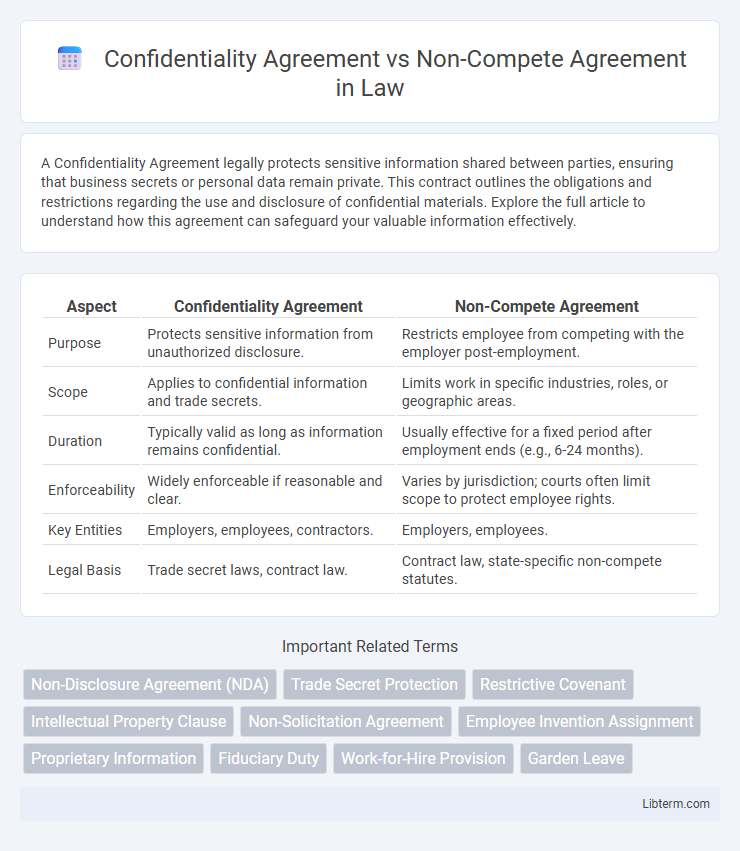A Confidentiality Agreement legally protects sensitive information shared between parties, ensuring that business secrets or personal data remain private. This contract outlines the obligations and restrictions regarding the use and disclosure of confidential materials. Explore the full article to understand how this agreement can safeguard your valuable information effectively.
Table of Comparison
| Aspect | Confidentiality Agreement | Non-Compete Agreement |
|---|---|---|
| Purpose | Protects sensitive information from unauthorized disclosure. | Restricts employee from competing with the employer post-employment. |
| Scope | Applies to confidential information and trade secrets. | Limits work in specific industries, roles, or geographic areas. |
| Duration | Typically valid as long as information remains confidential. | Usually effective for a fixed period after employment ends (e.g., 6-24 months). |
| Enforceability | Widely enforceable if reasonable and clear. | Varies by jurisdiction; courts often limit scope to protect employee rights. |
| Key Entities | Employers, employees, contractors. | Employers, employees. |
| Legal Basis | Trade secret laws, contract law. | Contract law, state-specific non-compete statutes. |
Understanding Confidentiality Agreements
Confidentiality agreements, also known as NDAs, legally bind parties to protect sensitive information from unauthorized disclosure, safeguarding trade secrets and proprietary data. These agreements ensure that employees, contractors, or partners do not share confidential business strategies, client details, or intellectual property with competitors or the public. Unlike non-compete agreements that restrict working in competing businesses, confidentiality agreements focus solely on information security, making them crucial for maintaining competitive advantage.
Key Elements of Non-Compete Agreements
Non-Compete Agreements typically include key elements such as the defined scope of restricted activities, geographic limitations, and duration of the agreement to prevent employees from joining competitors or starting similar businesses. These agreements also specify the types of work or industries covered, ensuring clarity on prohibited actions post-employment. Enforceability depends on reasonableness, protecting legitimate business interests without unduly restricting the employee's ability to earn a livelihood.
Core Differences Between Confidentiality and Non-Compete Agreements
Confidentiality agreements primarily protect sensitive information by legally binding parties to keep specific details secret, ensuring proprietary data, trade secrets, and business strategies remain undisclosed. Non-compete agreements restrict an individual's ability to engage in competing business activities within a certain geographical area and time frame after employment, aiming to prevent unfair competition. The core difference lies in confidentiality agreements focusing on safeguarding information, whereas non-compete agreements limit competitive behavior to protect business interests.
Legal Purpose of Each Agreement
A Confidentiality Agreement is designed to protect sensitive information shared between parties by legally restricting its disclosure to unauthorized individuals or entities, safeguarding trade secrets and proprietary data. A Non-Compete Agreement aims to prevent employees or contractors from engaging in competing business activities within specified geographic and temporal limits, thereby protecting a company's competitive advantage. Both agreements serve distinct legal purposes: confidentiality focuses on information security, while non-compete centers on limiting competitive threats.
Typical Clauses in Confidentiality vs Non-Compete Contracts
Confidentiality agreements typically include clauses on the definition of confidential information, obligations of the receiving party to maintain secrecy, permitted disclosures, duration of confidentiality, and consequences of breach. Non-compete agreements focus on restrictions related to geographic scope, duration of the non-compete period, specific prohibited activities or industries, and remedies for violations such as injunctive relief or damages. Both contracts often contain provisions regarding governing law, dispute resolution, and the survival of key obligations beyond the contract term.
Validity and Enforceability in Court
Confidentiality agreements are generally more enforceable in court because they protect specific proprietary information without overly restricting an individual's future employment, whereas non-compete agreements often face stricter scrutiny due to their potential to limit trade and restrict legitimate business competition. Courts typically require non-compete agreements to be reasonable in scope, duration, and geographic area to be valid; overly broad or indefinite restrictions are frequently deemed unenforceable. The enforceability of both agreements depends on jurisdiction-specific laws, but confidentiality agreements tend to maintain validity longer because they focus on safeguarding sensitive data rather than restricting professional mobility.
Common Use Cases in Business Settings
Confidentiality agreements are commonly used in business settings to protect sensitive information such as trade secrets, client lists, and proprietary data during partnerships, employee onboarding, and vendor negotiations. Non-compete agreements typically restrict employees or contractors from working with competitors or starting a competing business within a specified geographic area and time frame after leaving the company. Both agreements serve to safeguard business interests but address different aspects: confidentiality focuses on information protection while non-competes target competitive prevention.
Risks of Breaching Each Agreement
Breaching a Confidentiality Agreement can lead to significant risks such as loss of trade secrets, legal penalties, and damage to business reputation, potentially resulting in costly litigation and financial liability. Violating a Non-Compete Agreement may cause restrictions on employment opportunities, monetary damages for loss of competitive advantage, and enforcement through injunctions that can limit future career options. Both agreements carry the risk of strained professional relationships and can impact long-term business and personal trust.
How to Choose the Right Agreement for Your Needs
Choosing the right agreement depends on your primary goal: protect sensitive information or restrict competitive activities. A Confidentiality Agreement safeguards proprietary data and trade secrets, ideal for partnerships involving intellectual property or business secrets. In contrast, a Non-Compete Agreement limits a party's ability to engage in rival businesses, suited for scenarios where preventing direct competition is crucial to maintaining market share.
Best Practices for Drafting Effective Agreements
Confidentiality agreements should clearly define the scope of confidential information and specify the duration of secrecy obligations to ensure enforceability and protect sensitive data effectively. Non-compete agreements must include reasonable geographic and temporal restrictions aligned with state laws to balance business interests and employee rights. Precise language, clear terms, and legal compliance are essential best practices for drafting agreements that minimize disputes and uphold contractual integrity.
Confidentiality Agreement Infographic

 libterm.com
libterm.com